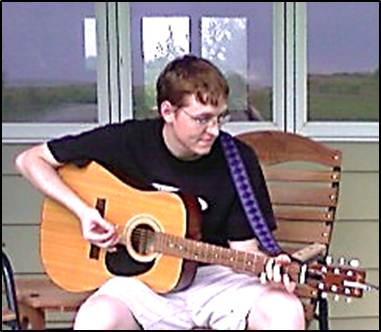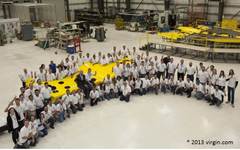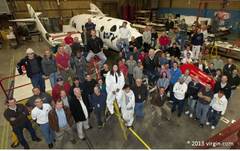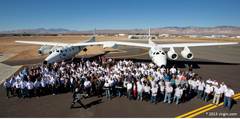
Name Kyle Hunt
- Education MS Aerospace Engineering, Wichita State University; BS Aerospace Engineering, University of Kansas
- Target Audience Undergraduate

Rocketing into outer-space is no longer limited to NASA's astronauts. Kyle Hunt and other aerospace engineers at Virgin Galactic are making space travel accessible to all earthlings aboard the first ever commercial spacecraft. Read on to learn more about the future of space travel and why we think aerospace engineers like Hunt are out of this world!
I am an aerospace engineer, but my official title at Virgin Galactic is Composite Stress Analyst Engineer. I am part of a team constructing the first commercial spacecraft ever built. At its most basic level, my job is to ensure that all of the aircraft and spacecraft we build are strong enough to safely operate. So, I analyze and test all of the structures we build to ensure they don't break when people fly.
It's probably fair to say I was obsessed with airplanes when I was young. I was 7 or 8 years old when I realized that everything we use doesn't just magically appear - someone has to design and build the desks, chairs, microwaves and airplanes. When I figured out there were people in the world that make airplanes, I decided that I wanted to do that too.

As a structural analyst there are really 2 parts to my job. There is the theoretical element that involves running computer simulations and doing math, and there is the practical part of my job that deals with the physical construction of aircraft. When you're creating brand new vehicles, like we are with our commercial spacecraft, you have to jump back and forth between theory and practice quite frequently. So, a typical day might include a meeting in the morning on how to reduce the weight of an aircraft or improve the overall design and then in the afternoon I might work in the shop overseeing the technicians or mechanics who physically construct what we designed and then deal with any abnormalities that come up during the construction process.
For the last 60 years space has basically been the domain of governments - they select the astronauts, put them in space and dictate where they go and what they do while up there. What we're trying to do at Virgin Galactic is to usher in the second wave of space travel and making it accessible to the public. Not to be overly dramatic, but in the course of human history we happen to live at a time where humans about to reach space in large numbers, and we (the Virgin Galactic team) are trying making that happen. Having the knowledge and opportunity to advance human exploration like that is thrilling a little humbling.

I've always been interested in STEM subjects, but I really only tolerated math. I prefer subjects rooted in the physical world like physics because you can see it and feel it. You know what happens when you throw a baseball in the air, but the actual science behind why it comes back down is fascinating. As far as math goes, I only started to appreciate the utility of it as an adult. When I got to college, I finally got to see how all the mathematical tools I'd been learning my whole life could be used to solve the engineering problems I was really interested in.
It was engineering school - it's a lot of work but there was really no way to get around it because it was the only way to learn everything I needed to know to make airplanes. You have to be really self-disciplined and learn to prioritize your time. After my 4 years of undergraduate work I really needed a break, so I worked for a few years before attending graduate school. Looking back on the whole experience, I'm glad it was as difficult as it was. Being pushed helped me grow, showed me what I'm capable of, and made be a better engineer.
There wasn't a particular person, it was more of the idea that airplanes had to be made and I could do that job. I felt this way at such a young age, so I didn't really need to be convinced or inspired by anyone. However, along the way there have been a lot of people who have supported me and helped me accomplish my goal of becoming an aerospace engineer. My parents were always there to indulge my engineering hobbies growing up - I don't know how many model airplanes I've built in my life, but the evidence is littered all over my parents' basement to this day.
There are several professional organizations, like the American Institute for Aeronautics and Astronautics (AIAA) that hold design, build and fly competitions for university students. I was fortunate to be able to participate in one of the competitions when I was in school and it's probably one of the best memories I have from my undergraduate experience. You get to work with your peers and take an idea from your brain and create something real. I totally, completely, massively recommend participating in one of those competitions if you have the opportunity in school. It looks great on your resume too.
Most importantly, apply for internships. Most engineering and manufacturing companies have paid summer internships for undergraduate students between their junior and senior years of college. Or, try to find research opportunities with a professor at your school. Both are a great way to figure out what you like and don't like, as well as getting real work experience under your belt.
 Where do you see your industry going in the future?
Where do you see your industry going in the future? Aerospace is literally limitless - 110 years ago airplanes didn't exist and 60 years ago we had never been into space. Now we're getting ready to fly anyone who wants to go into space with a commercial spacecraft. That's a tremendous amount of change and it's happening right now. No one really knows what the aerospace industry will look like 10, 20 or even 30 years from now, but it's definitely going to be more interesting than you can imagine. The entire industry is just loaded with science and math professionals, so it doesn't matter what STEM discipline you're focusing on, if you have any of those skills and want to be in aerospace there is a spot for you.
I love what I do - making airplanes and having this job at Virgin Galactic. All the hard work and long nights of engineering school was all worth it because I am doing what I love. Don't ever give up on your dreams - whatever they may be.
(adapted from virgingalactic.com)
Astronomer Frank Drake came up with an equation that helped start the s…
Rocketing into outer-space is no longer limited to NASA's astronauts. …